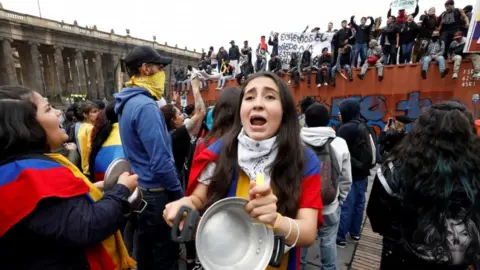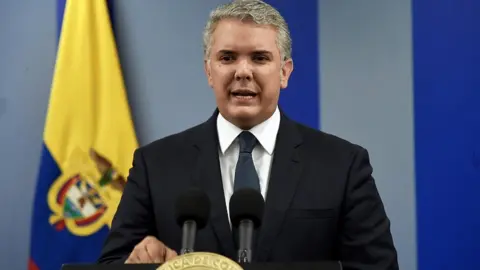Colombia protests: Bogotá placed under curfew amid fresh protests
The mayor of the Colombian capital, Bogotá, has imposed a curfew to cover the entire city in response to renewed anti-government protests.
Police fired tear gas in the city on Friday to disperse crowds and there were reports of sporadic looting.
Meanwhile, President Iván Duque said he would launch a "national conversation" next week to try to ease tensions.
More than 250,000 people attended marches across the country on Thursday to voice anger at the government.
Colombians have taken to the streets over possible changes to the minimum wage, pension and tax reforms, and the privatisation of state companies. The government insists there are no planned pension or labour reforms and that any changes would take place in consultation with labour groups.
Protesters are also angry about alleged corruption and what some see as the government's failure to honour a 2016 peace deal with left-wing Farc rebels amid a rise in violence.
In another development, three police officers were killed in a bomb explosion at a police station in the town of Santander de Quilichao in south-western Cauca province, officials said. It is not clear if the incident is connected to the protests. The area is notorious for drug trafficking and gang violence.
In Bogota, Mayor Enrique Peñalosa first announced a curfew for three districts but extended it to the whole city later in the day.
"From 8pm (01:00 GMT Saturday) the curfew will go into effect in the neighbourhoods of Bosa, Ciudad Bolivar and Kennedy," he said.
"From 9pm the curfew extends to the rest of the city. The curfews end at 6am Saturday."
Later, witnesses reported some protesters defying the curfew and picketing President Duque's home.
 EPA
EPAIn a televised speech, President Duque said a "national conversation" would take place regionally and include all social and political groups.
"Starting next week, I will launch a national conversation to strengthen the current social policy agenda, working in a united way with medium- and long-term vision, which will allow us to close the social gaps," he said.
Thousands of people had gathered in Bogotá's Bolivar Plaza earlier on Friday following a call from opposition leaders for renewed protests.
"We are here to keep protesting against the Duque government," said student Katheryn Martinez, 25, who was with her father Arturo, 55.
However, the crowd scattered when police fired tear gas. Witnesses said some protesters regrouped on nearby streets and continued chanting.
 EPA
EPADefence Minister Carlos Holmes Trujillo said an investigation had been launched into the three deaths in Valle del Cauca region on Thursday.
He told reporters that authorities had confirmed the deaths of two people in Buenaventura and one more in Candelaria. He added that a group of people had tried to loot a shopping centre.
He said 11 preliminary investigations were also being conducted into alleged misconduct by members of the security forces.
Unrest in Colombia has coincided with a surge of anti-government demonstrations elsewhere in Latin America.
In Chile, interior minister Gonzalo Blumel has again appealed for the restoration of public order after a fresh round of protests and riots there.
Protesters are demanding social reforms and a change to the constitution which dates back to the pre-democracy era of the military leader, Augusto Pinochet.
Meanwhile in Bolivia, violent protests have crippled parts of the country since the resignation former President Evo Morales.
Mr Morales fled to Mexico after the army urged him to quit. He and his supporters have described the move as a coup.